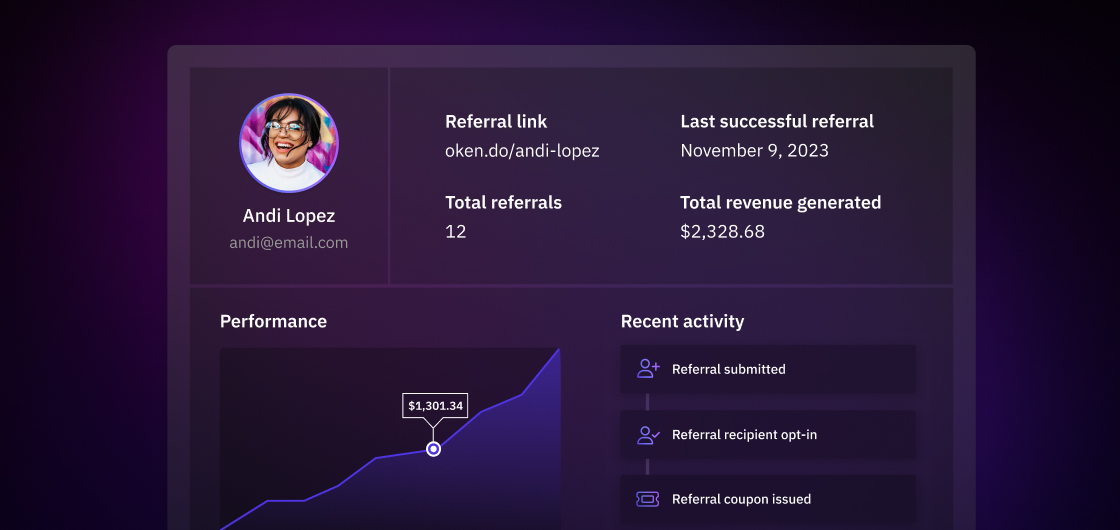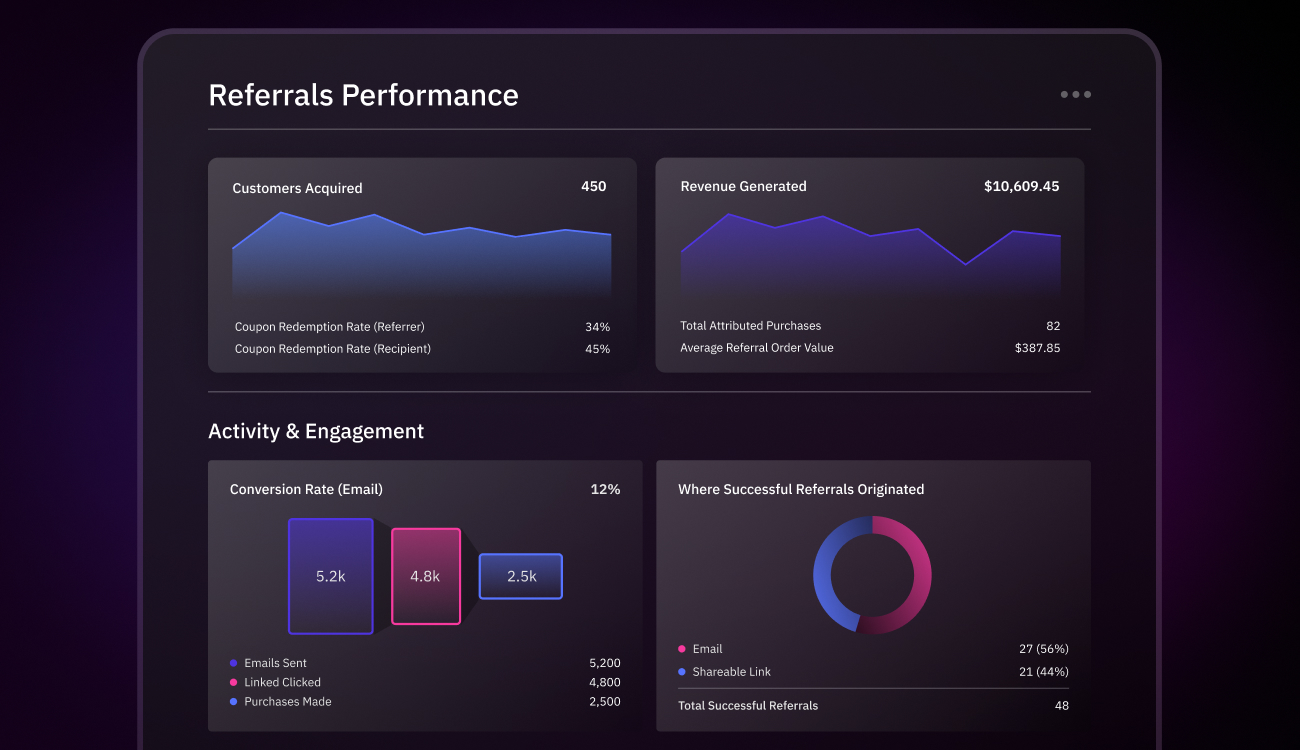
- Customer Marketing
- Personalization
- Quizzes
- Referrals
- Reviews and UGC
How Health and Wellness Ecommerce Brands Can Drive Success in 2025
Megan Wenzl | Nov 18, 2024
Aug 22, 2024 | 12 minute read

Megan Wenzl
Content Marketing Manager
Referral tracking is an effective marketing strategy that involves identifying, documenting, managing, analyzing, and optimizing referral activities. By leveraging referral tracking, brands can increase customer acquisition and conversion rates while gaining valuable customer insights, strengthening brand advocacy, and achieving measurable ROI. Platforms like Okendo Referrals streamline this process.
Over the last few decades, referral tracking has evolved into a vital marketing strategy for many brands. Business and healthcare industries originally valued this tool for its efficiency in managing large volumes of data and streamlining operational workflows. As the advantages of referral tracking became increasingly evident, it quickly became a key tool for marketers looking to strengthen brand credibility, deepen customer relationships, and drive sales.
The current widespread use of referral tracking systems by a diverse range of brands demonstrates their understanding of the pivotal role that customer satisfaction plays in their overall success and highlights the strategy’s broad benefits in a data-driven marketplace. Cost-effective, scalable, and easy to implement, these systems provide deep insights into customer motivations and capitalize on the powerful effect of word-of-mouth to transform satisfied customers into active brand promoters.
As markets continue to evolve and competition intensifies, leveraging an effective referral tracking system becomes not just a tactical move, but a critical strategy for engaging customers and achieving sustainable brand growth.
Referral tracking involves monitoring and measuring the effectiveness of a company’s referral tracking efforts. In other words, it quantifies the impact that referrals are having on your brand. This involves several key components:
Referral trackers are essential tools for improving both the efficiency and effectiveness of marketing strategies. By boosting customer acquisition and increasing customer retention and satisfaction, referral tracking supports budget management and strengthens future marketing initiatives. Any ecommerce brand, regardless of size or industry should strongly consider implementing a referral tracking system to maximize their marketing efforts and promote sustainable growth.
Tracking referrals is crucial for growing a brand.
Mohammadu Mifras, CEO of ShopTrade discusses the importance. He says, “Tracking referrals is crucial for brands as it helps identify the most effective channels driving new customers, enabling more strategic marketing investments and fostering stronger customer relationships. By understanding where their most valuable referrals come from, brands can optimize their efforts to enhance customer acquisition and retention.”
Here are the top five reasons why referral tracking should become a key part of your brand strategy today:
Implementing a referral tracking program can significantly boost customer acquisition via word-of-mouth, one of the simplest yet most effective forms of advertising. By leveraging the reach of digital platforms, the influence of social media personalities, the testimonies of satisfied customers, and the appeal of new customer incentives, a well-structured referral tracking program can become a powerful tool for acquiring new customers. This strategy taps into the inherent trust people place in personal recommendations, making it a highly effective method for expanding your customer base.
The second reason to track referrals is their significant impact on conversation rates. This is due to several factors. When the referrer and the referred share interests and passions, the likelihood of a purchase increases. Additionally, marketing platforms highlight endorsements with customer reviews and ratings, while social media platforms amplify these effects by showcasing public endorsements. Together, these tools create a powerful motivator that often leads to increased sales.
Referral tracking programs provide extensive and valuable insight into your customers, helping you understand various aspects of their behavior and preferences. These insights encompass many factors, such as what products and incentives are most appealing, what branding and messaging resonates with them, and even where they encounter obstacles in their buying journey. This level of insight can aid in producing loyal customers and in predicting future trends and informing proactive planning.
In addition to acquiring new customers, referral tracking is a powerful method to turn your existing customers into strong advocates for your brand. By establishing a system that allows them to share their positive experiences, the bond between customer and brand is naturally strengthened. This leads to authentic and personal referrals, which are an incredibly effective marketing tool. It also creates a community in which buyers engage at a deeper level. As happy, engaged customers turn into brand ambassadors, they attract more customers into the fold, further growing the brand’s reach and reputation, and eventually creating a cycle of growth.
Finally, referral tracking programs are critical for any brand looking to accurately determine their marketing initiative ROIs. These programs’ straightforward nature allows for the clear measurement of KPIs like number of referrals, conversion rates, and cost per customer acquisition. Furthermore, they are designed to scale seamlessly without significant increases in cost or labor. This is invaluable for future planning, as detailed analytics enable brands to make data-driven decisions that lead to both short-term profitability and long-term growth.
When choosing the right referral tracking system for your brand, you have two main options: manual and digital. Manual tracking, simpler in nature, requires significant human effort and meticulous attention to detail. It lacks the analytic depth of a digital approach and is much harder to scale. Manual methods are time-consuming, error-prone, and inefficient, making them less effective for brands wanting to scale.
On the other hand, a digital system offers a more sophisticated solution, with detailed analytics, scalability, and significantly fewer errors. These systems streamline the process, making it easier to manage. The combination of user-friendliness, improved efficiency, and deep insight makes it the clear choice for brands looking to optimize their referral tracking efforts.
Manual referral tracking is the traditional approach to recording and managing referral data. It typically uses tools such as spreadsheets, ledgers, and other manual data management referral forms that gather basic information including a name and email address. This simple and low-cost solution can be effective for smaller brands—startups, those with limited budgets, or companies with a small number of referrers.
However, manual tracking comes with significant limitations. Its analytic capabilities are typically quite basic, and the lack of real-time data can delay critical “in the moment” solutions. Additionally, manual tracking struggles to scale, becomes highly time-consuming, and is very prone to error, especially as your brand grows. Despite these limitations, there are several commonly used methods of manual referral tracking:
Digital referral tracking is the referral software solution to a manual tracking system. It involves automatically capturing and recording detailed data in real-time. This type of system aggregates categories such as the referrer, the referred, the method of referral, and any resulting actions (like purchases or sign-ups). Digital referral tracking can come as part of a CRM system or as a standalone application. It also helps to prevent referral fraud.
A referral program platform like Okendo Referrals automates the entire process, making it more efficient and accurate. It allows brands to seamlessly track referrals, measure their effectiveness, and reward participants, all within a single integrated system.
![]()
As you can see, a referral tracking system is integral to your larger marketing strategy because it enables you to turn simple word-of-mouth recommendations into measurable results. The following five aspects are important to consider when setting up referral tracking in your brand.
Unique identifiers are most often specific codes or links that track the referrer’s identity and the referred customer’s subsequent activity. The use of these identifiers allows brands to accurately trace the source of leads and conversions, providing a clear understanding of how different referral strategies are performing.
Automated tracking systems set the brand up for success by capturing and recording data continuously and in real-time. This type of system reduces the errors that can arise with manual tracking and enables the brand to streamline processes for a consistent and effective collection of crucial customer data. These systems ensure that all referral activities are tracked efficiently and therefore more reliably.
![]()
Accurate attribution ensures that every referral is correctly linked to its specific source, which is important for distributing incentives and rewards to the referrer and the referred customer. This process provides valuable insights that suggest which programs can be categorized as effective referral programs with successful referrals and which ones require optimization to improve ROI, allowing brands to allocate resources more effectively.
The ability of any referral tracking system to provide detailed analytics cannot be understated. Far more than what is possible via a manual tracking system, a digital system can provide comprehensive insight into the effectiveness of different referral sources, customer preferences and behavior, and the overall effectiveness of various marketing campaigns. These insights enable brands to make data-driven decisions and continuously refine their marketing efforts.

By providing clear incentives and rewards that are carefully tailored to the interests and needs of a specific customer base, brands can experience immediate profit, long-term growth, and viability in the marketplace. These incentives must be enticing to both the referrer and new customers, ensuring both parties feel valued and motivated to participate.
Okendo offers a comprehensive referral program that helps you gather critical information about your customers, and design customized campaigns tailored to their interests. By turning customers into advocates, Okendo’s system facilitates acquiring and retaining new customers, increasing your brand’s visibility, and growing your bottom line.
The following steps can be used to set up your referral program using Okendo. For more details on how Okendo Referrals can integrate referral tracking and rewards systems with your Shopify store, visit the Okendo Referrals support page.
Implementing a referral tracking software is essential for online brands looking to grow their customer base and sales both immediately and in the long term. As market dynamics and customer preferences evolve, having a system in place that can quickly and accurately measure the success of various referral strategies will become even more important. By utilizing platforms like Okendo, brands can not only refine their referral programs but also gain valuable insights, streamline their processes, and ultimately achieve sustainable growth.
Implementing a referral tracking system is typically quite straightforward. Many systems integrate directly with other digital marketing platforms and usually come with a guided setup process and customer support, similar to other marketing tools of this nature.
Many referral tracking systems automate the basic processes, including tracking referrals, attributions, and referral rewards. Additionally, many programs can integrate with various CRM and marketing platforms, increasing the volume of data you can collect and analyze.
Okendo Referrals is an excellent choice for Shopify stores. It offers comprehensive tracking of customer reviews and referral activities, helping brand owners boost customer engagement and optimize their marketing strategies.
Okendo tracks referral traffic using unique identifiers (codes, links, etc.) linked to detailed customer profiles. This automated process simplifies future analysis, enabling brands to quickly and thoroughly evaluate their program’s performance and make necessary adjustments.
Manual referral tracking involves recording referrals on paper or spreadsheets, which can work for smaller brands with fewer referrers or limited budgets. However, it is difficult to scale and prone to errors. Digital tracking, by contrast, uses automated software to analyze data in real time. It is low cost, low effort, and much more scalable as a brand grows.
Related articles
Ready to learn more?